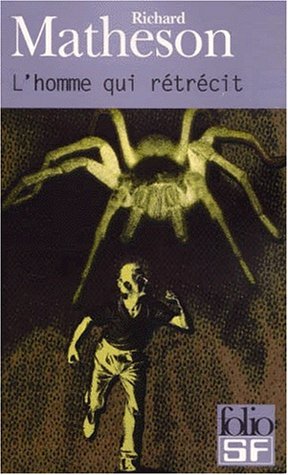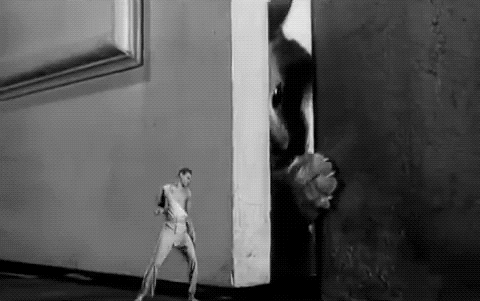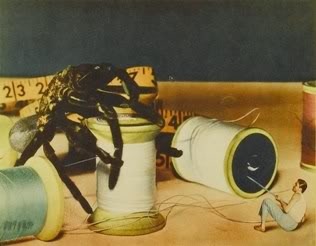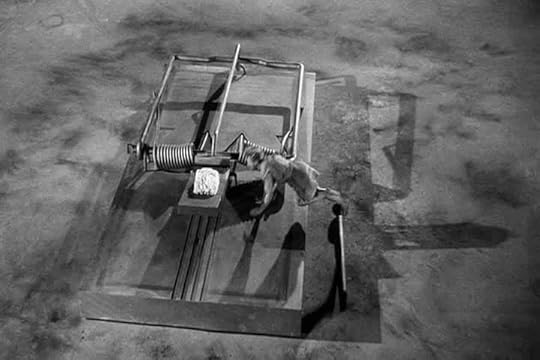What do you think?
Rate this book


271 pages, Mass Market Paperback
First published January 1, 1956




”The huge red serpent was a garden hose coiled on the floor; the immense orange structure was a stack of two wooden lawn chairs; the tank-like cans were used paint cans; and the spider was a black widow.”


"He looked at her full body again, feeling breath catch him uncontrollably. It wasn't just physical desire it was so much more. It was the dread of tomorrows without her. It was the horror of his plight, which no words could capture. For it was not a sudden incident removing him from her life. It wasn't a sudden illness taking him, leaving the memory of him intact, cutting him from her love with merciful swiftness. It wasn't even a lingering sickness. At least then he'd be himself and, although she could watch him with pity and terror, at least she would be watching the man she knew. This was worse, far worse."
"Odd that after all the moments of abject terror he had suffered contemplating the end of his existence, this night - he felt no terror at all. Hours way lay the end of his days. He knew, and still he was glad he was alive. That was the wonderful part of this moment. That was the thick blanket of contentment that warmed his toes. To know the end was close and not to mind. This, he knew, was courage, the truest, ultimate courage, because there was no one here to sympathize or praise him for it. What he felt was felt without the hope of commendation. Before it had been different. He knew that now. Before he had kept on living because he had kept on hoping. That was what kept most men living."
"But now, in the final hours, even hope had vanished. Yet he could smile. At a point without hope he had found contentment. He k re he had tried and there was nothing to be sorry for. And this was complete victory, because it was a victory over himself."
"I've fought a good fight, 'he said. It sounded funny to say it. He felt almost embarrassed. Then he shook away embarrassment. It was what was left to him. Why shouldn't he proclaim the bitter sweetness of his pride?
He bellowed at the universe. I've fought a good fight! And under his breath he added God damn it to hell. It made him laugh. His laughter was the faintest icy sprinkling of sound against the vast, dark earth. It felt good to sleep, under the stars."




He'd been running since it had all started. Running physically, from the man and the boys and the cat and the bird and the spider, and - a far worse kind of flight - running mentally. Running from life, from his problems and his fears; retreating, backtracking, facing nothing, yielding, giving in, surrendering.[Narration II] While Scott is shrinking from 68" through to becoming as small as being about a foot in height, the narration does not deal with mundane activities. This is the time when the writer describes of what the protagonist has to face during the period of his shrinkage: implications on his social and family life, the problems that he faces with his inability to use his sexual drive and the way he has to cope with it, the loss of authority of fatherhood to his daughter and in turn losing her respect, the insanity of going through a celebrity status, his thoughts on hopes of survivalism, questions on whether human life is valuable, purposeful and meaningful at such a small scale, etc.
He still lived, but was his living considered, or only an instinctive survival? Yes, he still struggled for food and water, but wasn't that inevitable if he chose to go on living. What he wanted to know was this: Was he a separate, meaningful person; was he an individual? Did he matter? Was it enough just to survive?
It was a thing about people. They did not look down expecting to see anything but dogs and cats.Some of these questions also come during the other narrative. This narration was however, the better part of the book for me, personally.
"He looked at her full body again, feeling breath catch him uncontrollably. It wasn't just physical desire it was so much more. It was the dread of tomorrows without her. It was the horror of his plight, which no words could capture. For it was not a sudden incident removing him from her life. It wasn't a sudden illness taking him, leaving the memory of him intact, cutting him from her love with merciful swiftness. It wasn't even a lingering sickness. At least then he'd be himself and, although she could watch him with pity and terror, at least she would be watching the man she knew. This was worse, far worse."
"Odd that after all the moments of abject terror he had suffered contemplating the end of his existence, this night - he felt no terror at all. Hours way lay the end of his days. He knew, and still he was glad he was alive. That was the wonderful part of this moment. That was the thick blanket of contentment that warmed his toes. To know the end was close and not to mind. This, he knew, was courage, the truest, ultimate courage, because there was no one here to sympathise or praise him for it. What he felt was felt without the hope of commendation. Before it had been different. He knew that now. Before he had kept on living because he had kept on hoping. That was what kept most men living.
But now, in the final hours, even hope had vanished. Yet he could smile. At a point without hope he had found contentment. He knew he had tried and there was nothing to be sorry for. And this was complete victory, because it was a victory over himself. I've fought a good fight, 'he said. It sounded funny to say it. He felt almost embarrassed. Then he shook away embarrassment. It was what was left to him. Why shouldn't he proclaim the bittersweetness of his pride?
He bellowed at the universe. I've fought a good fight! And under his breath he added God damn it to hell. It made him laugh. His laughter was the faintest icy sprinkling of sound against the vast, dark earth. It felt good to sleep, under the stars."
For a moment the entire grotesque spectacle of it swept over him forcibly, the insanity of a world where he could be killed trying to climb to the top of a table that any normal man could lift and carry with one hand.
Was he a separate, meaningful person; was he an individual? Did he matter? Was it enough just to survive?